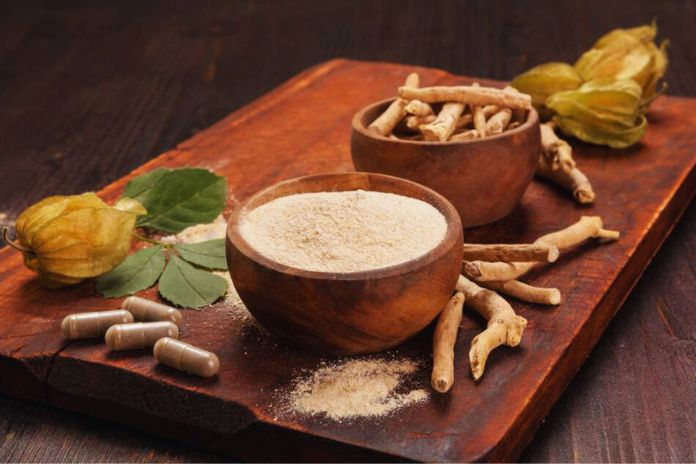Ashwagandha, referred to deductively as Withania somnifera, is an essential therapeutic spice in Ayurveda, India’s conventional arrangement of medication. For centuries, it has been utilized for its adaptogenic properties, assisting the body with overseeing pressure. Notwithstanding its impacts on pressure and uneasiness, Ashwagandha offers various medical advantages, especially for skin and hair, and works on mental execution. A few brands like Nutrimuscle, Nutripure, Nutrixeal, or Sunday Regular sell ashwagandha supplements. Be that as it may, little data is accessible on its possible secondary effects or collaborations with meds.
Side Effects And Contraindications
Despite the fact that Ashwagandha is viewed as safe for most grown-ups when taken in suggested portions, a few secondary effects might happen, including minor gastrointestinal surprises like the runs and heaving, tiredness, and, in uncommon cases, hypersensitive responses. Contraindications incorporate the accompanying circumstances:
Pregnancy And Breastfeeding
The use of Ashwagandha during pregnancy and breastfeeding requires special consideration due to the lack of sufficient data on its safety in these conditions. The active ingredients in Ashwagandha may cross the placental barrier or be excreted in breast milk, raising concerns about the potential impact on fetal development or infant health.
Animal studies have indicated potentially harmful effects on embryonic development, although human data remains limited. Caution is all the more justified as the effects on hormonal balance induced by Ashwagandha can affect pregnancy. The lack of extensive clinical research on pregnant women means that the potential risks to the fetus are not well understood, leading to a general recommendation to avoid its use during this period.
When it comes to breastfeeding, there needs to be more information available on the safety of Ashwagandha. The herb’s active compounds could be transferred to infants through breast milk, with unknown consequences for the child’s health and development. In the absence of studies confirming the safety of Ashwagandha during breastfeeding, caution recommends avoiding its use.
The Days Before Surgery
Using Ashwagandha before surgery requires special care due to its potential effects on the cardiovascular system, nervous system, and blood clotting. Here is why it is advisable to stop taking Ashwagandha before surgery:
- Effects on Blood Pressure: Because Ashwagandha may act on the cardiovascular system, potentially lowering blood pressure in some individuals, its use before surgery could interfere with blood pressure management during surgery. Hemodynamic stability is crucial during surgery, and any unexpected fluctuations in blood pressure can present additional challenges for the surgical team.
- Interactions with anesthetics and other perioperative medications: Ashwagandha may interact with medicines used during surgery, including anesthetics and sedatives, potentially increasing their effect. This could make it more challenging to control sedation and pain during and after surgery. Additionally, since Ashwagandha may affect drug metabolism, there is a risk of unanticipated interactions with other medications administered around the time of surgery.
Interaction with drugs
Ashwagandha is a medicinal plant valued for its many health benefits, but it can interact with certain medications, changing their effectiveness or exacerbating their side effects. Here is an overview of the main categories of drugs that Ashwagandha could potentially interact with:
Sedatives such as benzodiazepines, barbiturates, and certain sleeping pills
The interaction between Ashwagandha and sedatives, including benzodiazepines, barbiturates, and other sleep aids, raises essential considerations due to Ashwagandha’s calming and anxiolytic properties. This medicinal plant is traditionally used for its stress-reducing and sleep-enhancing effects, attributable to its ability to modulate neurochemical pathways, including enhancing the activity of the inhibitory neurotransmitter GABA (gamma-aminobutyric acid).
Taking Ashwagandha concomitantly with sedative medications, which also exert their effects by facilitating GABA activity or depressing the central nervous system, can potentially amplify the overall soothing effect. This could increase the risk of excessive sedation, drowsiness, difficulty concentrating, or even depressive respiratory effects in some individuals.
OADs Or Oral Antidiabetics
Ashwagandha is recognized for its adaptogenic properties and its potential to positively influence several aspects of health, including glucose metabolism, making it relevant for people who have diabetes. Preclinical studies suggest that Ashwagandha may help reduce blood glucose levels, attributable to its ability to improve insulin sensitivity and promote efficient use of glucose by cells. However, this hypoglycemic action may interact with oral antidiabetic medications, such as metformin or sulfonylureas, which are designed to control blood sugar levels. Concomitant use of Ashwagandha with these medications could lead to hypoglycemia, a condition where blood sugar drops to a dangerously low level.
Medications For Hypertension
The interaction between ashwagandha and blood pressure medications requires special attention due to Ashwagandha’s potential effects on regulating blood pressure. Ashwagandha is known for its adaptogenic properties, including the ability to influence the cardiovascular and endocrine systems, which can indirectly affect blood pressure. Although research is still ongoing to fully understand its mechanism of action, some studies suggest that Ashwagandha, like other plants, may exert a hypotensive effect, in part through its ability to reduce stress and anxiety, which are factors contributing to hypertension.
The combined use of Ashwagandha with antihypertensive medications, such as angiotensin-converting enzyme inhibitors (ACEIs), beta-blockers, or diuretics, could enhance the blood pressure-lowering effect. Arterial pressure. This can lead to hypotension, a drop in blood pressure below normal levels, which can cause symptoms such as dizziness, fatigue, nausea, or even an increased risk of falls. In some individuals, especially older people or those with underlying cardiovascular conditions.
Immunosuppressants
The interaction between Ashwagandha and immunosuppressants deserves special attention due to its potential immunomodulatory properties. ThAshwagandha is traditionally used for its benefits in strengthening the immune system, thanks to its ability to increase the production of immune cells and improve the overall immune response. However, for people taking immunosuppressants, often prescribed after an organ transplant to prevent rejection of the transplanted organ or to treat certain autoimmune diseases, using ashwagandha couAshwagandhaks.
Immunosuppressants work by reducing the activity of the immune system to prevent the body from attacking the transplanted organ or overreacting to its cells in autoimmune diseases. The introduction of Ashwagandha, with lasting effects on the immune system, could counteract the effect of immunosuppressive medications, thereby increasing the risk of transplant rejection or exacerbation of autoimmune symptoms.
Thyroid Medications
The interaction between Ashwagandha and Ashwagandhas used to treat hyperthyroidism requires careful analysis due to the potential effects of Ashwagandha on Ashwagandha Action. Ashwagandha is known for its adaptogenic properties, including the ability to influence hormone levels in the body, which can impact thyroid function.
Preliminary research suggests that Ashwagandha may secrete thyroid hormones, including thyroxine (T4) and possibly triiodothyronine (T3), which is beneficial in cases of hypothyroidism or low thyroid activity. However, for individuals suffering from hyperthyroidism, a condition characterized by excessive production of thyroid hormones, there are concerns about adding a supplement that could further increase thyroid hormone levels.
Hyperthyroid medications, such as methimazole or propylthiouracil, are prescribed to reduce the activity of the thyroid gland and decrease the production of thyroid hormones. Concomitant use of Ashwagandha Ashwagandha increases thyroid hormone production and could interfere with the action of these medications, making treatment for hyperthyroidism less effective. This could lead to insufficient management of hyperthyroidism, with increased risks of symptoms such as tachycardia, weight loss, insomnia, and other complications.
Conclusion
In spite of the fact that Ashwagandha is alright for the vast majority when utilized suitably, it is fundamental to know about its possible secondary effects and medication cooperation. Similarly, as with any enhancement, the most reasonable methodology is to begin with low portions and incremental steps while observing the body’s reactions.
Read Also: Winter Depression? Watch Your Nutrition




